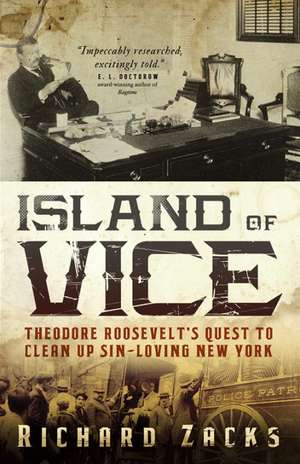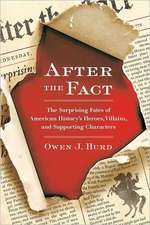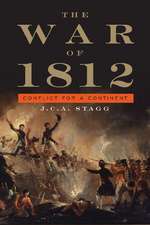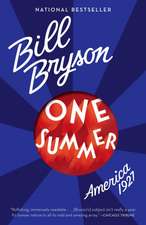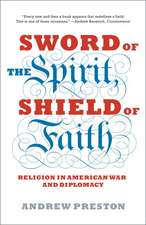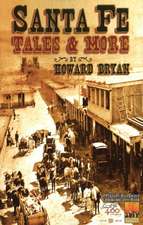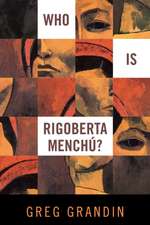Island of Vice: Theodore Roosevelt's Quest to Clean Up Sin-Loving New York
Autor Richard Zacksen Limba Engleză Paperback – 3 sep 2012
The city rebelled big time; cartoonists lampooned him on the front page; his own political party abandoned him but Roosevelt never backed down. Island of Vice delivers a rollicking narrative history of Roosevelt’s embattled tenure, pitting the seedy against the saintly, and the city against its would-be savior.
Preț: 125.84 lei
Nou
Puncte Express: 189
Preț estimativ în valută:
24.08€ • 25.21$ • 19.92£
24.08€ • 25.21$ • 19.92£
Carte disponibilă
Livrare economică 17-31 martie
Preluare comenzi: 021 569.72.76
Specificații
ISBN-13: 9780767926195
ISBN-10: 0767926196
Pagini: 431
Dimensiuni: 127 x 201 x 28 mm
Greutate: 0.43 kg
Editura: Anchor Books
ISBN-10: 0767926196
Pagini: 431
Dimensiuni: 127 x 201 x 28 mm
Greutate: 0.43 kg
Editura: Anchor Books
Notă biografică
Richard Zacks got his book-writing start specializing in lewd and offbeat history. His An Underground Education and History Laid Bare are classics of their kind. More recently, he is the author of The Pirate Hunter: The True Story of Captain Kidd, chosen by Time in 2002 as one of the five best nonfiction books of the year; and The Pirate Coast (2005). His writing has appeared in The New York Times, Atlantic Monthly, Time, Life, Harper’s, Sports Illustrated, Village Voice, and other publications. He writes in a small office overlooking Union Square in New York City.
Extras
1
PARKHURST AND THE SIN TOUR
The battle started with a poorly researched sermon.
The Reverend Charles H. Parkhurst, adorned with an abundant goatee and steel-rimmed, thick-lensed glasses, just shy of his fiftieth birthday, stood on February 14, 1892, before about 800 well-dressed parishioners in Madison Square Presbyterian Church, at 24th Street off the park. The understated building-a long and narrow slab of drab brownstone with a classic steeple-evoked earnestness, in stark contrast to the exuberant yellow-and-white Madison Square Garden tower nearby, topped by nude spinning Diana. In the pews sat the city's elite; scrubbed boys and girls fidgeted but their parents certainly did not, not that morning.
Parkhurst sent no advance notice of the subject of his sermon nor did he distribute the text to the press during the prior week, but afterward almost every newspaper requested it.
Parkhurst didn't thunder from the pulpit. He spoke evenly and favored erudite words, befitting an Amherst graduate (class of 1866), one who had studied abroad at Leipzig and once penned an essay on similarities between Latin and Sanskrit verbs. He sometimes showed a sly dry wit.
On that Sunday winter morning, his calmly delivered words stunned his audience. He called the Tammany men ruling New York, especially the mayor, the district attorney, and the police captains, "a lying, perjured, rum-soaked and libidinous lot." He accused them of licensing crime, of polluting the city for profit. He said he would "not be surprised to know that every building in this town in which gambling or prostitution or the illicit sale of liquor is carried on has immunity secured to it by a scale of police taxation" as "systematized" as the local real estate taxes. He asserted "your average police captain is not going to disturb a criminal if the criminal has means."
Parkhurst was born on a farm outside Framingham, Massachusetts; he revered his rural roots. He had never seen vice until he moved to the big city. He taught school till age thirty-three. For the past dozen years at Madison Square Presbyterian he had been praised for geniality and charitable works but was little known outside his congregation.
That would change overnight.
The minister, his quiet cadence building, wrapped his sermon in a biblical theme, charging that gambling places "flourish on all these streets almost as thick as roses in Sharon," that day or night, "our best and most promising young men" waste hours in those "nefarious dens." He said he had firsthand experience that the city government "shows no genius in ferreting out crime, prosecutes only when it has to, and has a mind so keenly judicial that almost no amount of evidence that can be heaped up is accepted as sufficient to warrant indictment."
He explained that, as the president of the Society for the Prevention of Crime, he had recently met with the district attorney and confronted him about McGlory's-a notorious den of prostitutes and thieves that thrived for years. The D.A. had replied that he had no idea that such "vile institutions" existed. "Innocence like that," added Dr. Parkhurst, "in so wicked a town ought not to be allowed to go abroad after dark."
Parkhurst promised his rapt congregation that he was not speaking as a Democrat or a Republican but as a Christian. He complained that the word protest was no longer driving "Protestants." He called for action.
"Every effort that is made to improve character in this city, every effort to make men respectable, honest, temperate and sexually clean is a direct blow between the eyes of the Mayor and his whole gang of drunken and lecherous subordinates."
Tammany Hall was a vast Democratic political club, a confederacy of strivers that had ruled the city since the late 1860s. The organization blessed lawbreaking mostly of a victimless nature in exchange for a payoff. Cops, many with Irish accents, closed their eyes, and police captains and Tammany grew rich with the blindness. The annual rakeoff totaled in the millions of dollars, back when the average annual wage topped out at $500 or less. The boodle was breathtaking. All the while, the great city, growing into a cosmopolitan masterpiece, prospered, with lip-service platitudes about morality by cynical Tammany Hall orators and everyday embrace of vice.
The Tammany machine prospered, despite the downfall of "Boss Tweed." The machine engineered many landslide victories. The Democrats of Tammany, dominated by the Irish, harnessed the votes of new immigrants through gifts of coal and ice, and a job. "If a family is burned out," explained state senator George Washington Plunkitt, "I don't ask whether they are Republicans or Democrats, and I don't refer them to the Charity Organization Society, which would investigate their case in a month or two and decide they were worthy of help about the time they are dead from starvation . . . I just get [living] quarters for them, buy clothes for them."
Tammany harnessed the loyalty of fellow politicians and campaign donors through larger gifts than buckets of coal. A Tammany contractor, when confronted with delivering one-tenth of the agreed-upon amount of sponges to the sanitation department, replied under oath: "Hell, did you weigh them dry?" The current Tammany boss, Richard Croker, a hulking, inarticulate bruiser, discovered that "successful government in the American democracy was a vile exchange of favors, and his abiding offense is that he demonstrated the fact," wrote Thomas Beer, author of The Mauve Decade.
The cops often formed the front line in the corruption of the city, interacting with criminals and citizens alike. Employment records reveal that about two-thirds of the police force were undereducated Irishmen or first-generation Irish Americans, as were most of the top men in Tammany Hall. These tough fellows-whose ancestors had suffered through what they deeply perceived as centuries of British Protestant misrule and injustice-didn't give a fiddler's fart for the mostly Protestant, mostly wealthy reformers of New York.
Reformers boiled with indignation at this lawlessness, but Tammany-when it bothered to discuss the matter-privately defended its actions as giving the people what they wanted. The vast majority of New Yorkers wanted to drink beer in saloons on Sundays, their only day off from a fifty-hour workweek. We take a cut to undo the killjoy misery the Republicans are trying to inflict. Men who wanted to put a dollar on Lovely Lorna in the fifth race at Gravesend could find a Tammany-protected curbstone bookie. Poor girls who didn't want to earn a dollar a day standing for twelve hours in a Sixth Avenue department store could earn that amount in less than an hour in a brothel-if they so chose.
Parkhurst was in effect demanding a holy war on vice and government collusion. The next day, Tammany Hall officials, buttonholing any available reporter, voiced their utter outrage that a man of the cloth would dare pollute the pulpit with such unsubstantiated charges. Several fellow ministers and even some Republican politicians thought Parkhurst had gone too far. He expected a fight, but he was flabbergasted when Tammany district attorney DeLancey Nicholl called him before a grand jury on charges of libel.
The minister was in effect attacking the respectable wing of Tammany Hall-not the election-day thugs or street-corner bullies, but the elite corps of the organization: men in silk top hats, men who cut ribbons on new buildings, men who gave speeches about the paving of the avenues.
These men-many now wealthy and respectable in Democratic circles-didn't appreciate being called "a damnable pack of administrative bloodhounds . . . fattening themselves on the ethical flesh of and blood" of New York.
On March 1, that grand jury delivered a scathing presentment indicating that the minister had "no evidence" on which to base his statements; the Tammany judge, reading the report, sanctimoniously rued the day a clergyman would try to destroy lives based on "nothing but rumor, nothing but hearsay." Judge Martine added: "Well-meaning people who go off half-cocked are a terror and a stumbling block to every good cause."
Even Parkhurst himself would later concede of his February sermon: "I could not swear as of my own knowledge that the district attorney had lived an immoral life, that police officers were blackmailers, that police justices encouraged bunco-steering and abortion or that the entire Tammany organization was not a disguised wing of the Prohibition Party."
Reverend Parkhurst vowed that he would "never again be caught in the presence of the enemy without powder and shot in my gun-barrel."
He knew-and he knew that all those seemingly shocked Tammany officials also knew-that his charges of widespread vice and police complicity were absolutely true. Now he must go out and prove them. Parkhurst, the married middle-aged minister, hired a young private detective named Charlie Gardner to take him on the ultimate sin tour of New York City.
On the evening of Saturday, March 5, 1892, twenty-six-year-old Charlie Gardner, an independent detective trying to launch his own agency after five years at the Gerry Society for the Prevention of Cruelty to Children, showed up at Dr. Parkhurst's home at 133 East 35th Street. Gardner came recommended by a wealthy member of the congregation, though he was a rough-around-the-edges investigator-he'd had several run-ins with the police over the years. He dressed sharp, tried to act a bit jaded, and sprinkled his conversation with slang. Despite working for the Gerry Society, he liked to drink, especially beer and wine, and the police had accused a few of his partners of shaking down suspects. They also would later claim that his ex-wife had participated in a scheme to abduct girls for brothels. (Parkhurst knew none of this at the time.)
A strapping six footer, with blondish-red hair, pink cheeks, and a clipped mustache, he looked younger than his announced mid-twenties age. Gardner had a mischievous side and seemed very much to enjoy the prospect of corrupting the Madison Avenue minister. "I still flatter myself that I whirled him from the pinnacle of a church leader to the depths of criminal New York at a pace never taken by any other man," Gardner would later write in his memoir The Doctor and the Devil. Parkhurst, for his part, would very soon state from the pulpit: "I never dreamed that any force of circumstances would ever draw me into contacts so coarse, so bestial, so consummately filthy as those I have repeatedly found myself in the midst of these last few days. I feel as though I want to go out of town for a month to bleach the sense of it out of my mind, and the vision of it out of my eyes."
Gardner arrived at Parkhurst's townhouse; his fee had already been negotiated: the ample sum of $5 a night, plus expenses. A young devout parishioner had volunteered to go along with the reverend as another witness. Both the parishioner and Parkhurst had dressed for slumming.
Gardner took one look at the two of them and burst out laughing.
Parkhurst wore his oldest black broadcloth suit-frayed at the cuffs but still ministerial. Twenty-five-year-old John Langdon Erving-tall, thin, delicate, with large blue eyes and blond hair parted in the middle-wore clothes fished from the depths of his closet. The wealthy young man, with a Van Rensselaer in his family tree, looked like "a Fifth Avenue lounger . . . a fashion plate of a dead year," according to Gardner. Erving taught Sunday school, led polite high-society dances, and gave off a sheltered otherworldly air. His religious devotion sometimes worried his parents.
Gardner told Parkhurst and Erving that they would get barred from joints or perhaps beat up on principle dressed that way. He hailed a carriage and took them to his apartment at 207 West 18th Street for the slum tour makeover. The tall detective decked out Reverend Parkhurst in a pair of his own black-and-white-checked trousers "loud enough to make a noise in the next block," and Gardner cinched them up so high on Parkhurst's chest that "to get in his hip pocket, the Doctor would have had to run his hand down the neck of his shirt." He added a worn double-breasted sailor's jacket, but Gardner still found Parkhurst looking faintly churchly so he wrapped a ripped red sleeve around Parkhurst's neck as a scarf and soaped down the minister's wavy coiffed hair to a greasy, limp derelict look. The final touch was an old dirty brown slouch hat.
For Erving's makeover, Gardner slid the young man's delicate feet out of fine leather shoes and into big awkward rubber boots and gave him a pair of pants that didn't reach within five inches of the ground. He mussed his hair to remove that college-boy center part. A puffy red satin necktie provided the final found-in-the-ashcan touch.
The trio boarded the Third Avenue Elevated, traveling downtown from 18th Street to Franklin Square in the older part of the city. The disguises seemed to be working, as a pretty young woman irritatedly moved her skirts away from Dr. Parkhurst. Gardner had decided to start with the waterfront dives of Cherry and Water Streets that attracted alcoholics, prostitutes, and thieves, and go sleazier from there.
The Cherry Hill neighborhood was once fashionable enough to attract the likes of then president George Washington, but now gangs ruled the streets, including "Swamp Angels" who pulled heists, then disappeared into the city's sewers. Dilapidated buildings housed a mongrel mix of Irish and Italians and visiting sailors, with one block dubbed Penitentiary Row.
Gardner shepherded his wide-eyed twosome into 33 Cherry Street, a typical dive saloon in a ramshackle two-story building with a long bar and a moth-eaten green pool table in the back. The pool players peered over a five-foot partition and eyed the three newcomers as fresh prey.
Gardner introduced Parkhurst-who was about half a head shorter-as his "South Carolina uncle" to the bartender. To kick off the first night, Gardner ordered them each a ten-cent glass of whiskey from a bottle labeled "Manhattan Club Reserve." Dr. Parkhurst-maybe to settle his nerves or show his resolve-downed his in a gulp. (Gardner would find himself impressed by Parkhurst's "capacity for holding liquor," stating that the minister vomited only once in their several nights out.) Aristocratic Erving swallowed his but immediately poured himself a water chaser, "a breach of Cherry Street etiquette that brought a smile of contempt" from the bartender.
The young detective told the barkeep that his "South Carolina uncle" was looking to buy a "clock and slang" (i.e., a gold watch and chain). Tom Summers fanned out a stack of pawn tickets. (Summers's customers stole, say, a watch, pawned it for a pittance, maybe 10 percent of its value, bought drinks, then used the pawn ticket for a last round.) Barkeep Summers didn't ask many questions; neither did the pawnbrokers; neither did fellows buying pawn tickets from Summers.
Parkhurst's education was beginning.
He noticed several boys and girls, about ten years old, whose heads didn't reach the bar, motioning to the bartender and pointing to the pitchers and cans they were carrying. The children handed over coins, and the bartender filled the containers with beer, which the children tried not to spill as they hauled them outside. (Children "rushing the growler" for their parents, even at midnight, was a New York tradition.)
PARKHURST AND THE SIN TOUR
The battle started with a poorly researched sermon.
The Reverend Charles H. Parkhurst, adorned with an abundant goatee and steel-rimmed, thick-lensed glasses, just shy of his fiftieth birthday, stood on February 14, 1892, before about 800 well-dressed parishioners in Madison Square Presbyterian Church, at 24th Street off the park. The understated building-a long and narrow slab of drab brownstone with a classic steeple-evoked earnestness, in stark contrast to the exuberant yellow-and-white Madison Square Garden tower nearby, topped by nude spinning Diana. In the pews sat the city's elite; scrubbed boys and girls fidgeted but their parents certainly did not, not that morning.
Parkhurst sent no advance notice of the subject of his sermon nor did he distribute the text to the press during the prior week, but afterward almost every newspaper requested it.
Parkhurst didn't thunder from the pulpit. He spoke evenly and favored erudite words, befitting an Amherst graduate (class of 1866), one who had studied abroad at Leipzig and once penned an essay on similarities between Latin and Sanskrit verbs. He sometimes showed a sly dry wit.
On that Sunday winter morning, his calmly delivered words stunned his audience. He called the Tammany men ruling New York, especially the mayor, the district attorney, and the police captains, "a lying, perjured, rum-soaked and libidinous lot." He accused them of licensing crime, of polluting the city for profit. He said he would "not be surprised to know that every building in this town in which gambling or prostitution or the illicit sale of liquor is carried on has immunity secured to it by a scale of police taxation" as "systematized" as the local real estate taxes. He asserted "your average police captain is not going to disturb a criminal if the criminal has means."
Parkhurst was born on a farm outside Framingham, Massachusetts; he revered his rural roots. He had never seen vice until he moved to the big city. He taught school till age thirty-three. For the past dozen years at Madison Square Presbyterian he had been praised for geniality and charitable works but was little known outside his congregation.
That would change overnight.
The minister, his quiet cadence building, wrapped his sermon in a biblical theme, charging that gambling places "flourish on all these streets almost as thick as roses in Sharon," that day or night, "our best and most promising young men" waste hours in those "nefarious dens." He said he had firsthand experience that the city government "shows no genius in ferreting out crime, prosecutes only when it has to, and has a mind so keenly judicial that almost no amount of evidence that can be heaped up is accepted as sufficient to warrant indictment."
He explained that, as the president of the Society for the Prevention of Crime, he had recently met with the district attorney and confronted him about McGlory's-a notorious den of prostitutes and thieves that thrived for years. The D.A. had replied that he had no idea that such "vile institutions" existed. "Innocence like that," added Dr. Parkhurst, "in so wicked a town ought not to be allowed to go abroad after dark."
Parkhurst promised his rapt congregation that he was not speaking as a Democrat or a Republican but as a Christian. He complained that the word protest was no longer driving "Protestants." He called for action.
"Every effort that is made to improve character in this city, every effort to make men respectable, honest, temperate and sexually clean is a direct blow between the eyes of the Mayor and his whole gang of drunken and lecherous subordinates."
Tammany Hall was a vast Democratic political club, a confederacy of strivers that had ruled the city since the late 1860s. The organization blessed lawbreaking mostly of a victimless nature in exchange for a payoff. Cops, many with Irish accents, closed their eyes, and police captains and Tammany grew rich with the blindness. The annual rakeoff totaled in the millions of dollars, back when the average annual wage topped out at $500 or less. The boodle was breathtaking. All the while, the great city, growing into a cosmopolitan masterpiece, prospered, with lip-service platitudes about morality by cynical Tammany Hall orators and everyday embrace of vice.
The Tammany machine prospered, despite the downfall of "Boss Tweed." The machine engineered many landslide victories. The Democrats of Tammany, dominated by the Irish, harnessed the votes of new immigrants through gifts of coal and ice, and a job. "If a family is burned out," explained state senator George Washington Plunkitt, "I don't ask whether they are Republicans or Democrats, and I don't refer them to the Charity Organization Society, which would investigate their case in a month or two and decide they were worthy of help about the time they are dead from starvation . . . I just get [living] quarters for them, buy clothes for them."
Tammany harnessed the loyalty of fellow politicians and campaign donors through larger gifts than buckets of coal. A Tammany contractor, when confronted with delivering one-tenth of the agreed-upon amount of sponges to the sanitation department, replied under oath: "Hell, did you weigh them dry?" The current Tammany boss, Richard Croker, a hulking, inarticulate bruiser, discovered that "successful government in the American democracy was a vile exchange of favors, and his abiding offense is that he demonstrated the fact," wrote Thomas Beer, author of The Mauve Decade.
The cops often formed the front line in the corruption of the city, interacting with criminals and citizens alike. Employment records reveal that about two-thirds of the police force were undereducated Irishmen or first-generation Irish Americans, as were most of the top men in Tammany Hall. These tough fellows-whose ancestors had suffered through what they deeply perceived as centuries of British Protestant misrule and injustice-didn't give a fiddler's fart for the mostly Protestant, mostly wealthy reformers of New York.
Reformers boiled with indignation at this lawlessness, but Tammany-when it bothered to discuss the matter-privately defended its actions as giving the people what they wanted. The vast majority of New Yorkers wanted to drink beer in saloons on Sundays, their only day off from a fifty-hour workweek. We take a cut to undo the killjoy misery the Republicans are trying to inflict. Men who wanted to put a dollar on Lovely Lorna in the fifth race at Gravesend could find a Tammany-protected curbstone bookie. Poor girls who didn't want to earn a dollar a day standing for twelve hours in a Sixth Avenue department store could earn that amount in less than an hour in a brothel-if they so chose.
Parkhurst was in effect demanding a holy war on vice and government collusion. The next day, Tammany Hall officials, buttonholing any available reporter, voiced their utter outrage that a man of the cloth would dare pollute the pulpit with such unsubstantiated charges. Several fellow ministers and even some Republican politicians thought Parkhurst had gone too far. He expected a fight, but he was flabbergasted when Tammany district attorney DeLancey Nicholl called him before a grand jury on charges of libel.
The minister was in effect attacking the respectable wing of Tammany Hall-not the election-day thugs or street-corner bullies, but the elite corps of the organization: men in silk top hats, men who cut ribbons on new buildings, men who gave speeches about the paving of the avenues.
These men-many now wealthy and respectable in Democratic circles-didn't appreciate being called "a damnable pack of administrative bloodhounds . . . fattening themselves on the ethical flesh of and blood" of New York.
On March 1, that grand jury delivered a scathing presentment indicating that the minister had "no evidence" on which to base his statements; the Tammany judge, reading the report, sanctimoniously rued the day a clergyman would try to destroy lives based on "nothing but rumor, nothing but hearsay." Judge Martine added: "Well-meaning people who go off half-cocked are a terror and a stumbling block to every good cause."
Even Parkhurst himself would later concede of his February sermon: "I could not swear as of my own knowledge that the district attorney had lived an immoral life, that police officers were blackmailers, that police justices encouraged bunco-steering and abortion or that the entire Tammany organization was not a disguised wing of the Prohibition Party."
Reverend Parkhurst vowed that he would "never again be caught in the presence of the enemy without powder and shot in my gun-barrel."
He knew-and he knew that all those seemingly shocked Tammany officials also knew-that his charges of widespread vice and police complicity were absolutely true. Now he must go out and prove them. Parkhurst, the married middle-aged minister, hired a young private detective named Charlie Gardner to take him on the ultimate sin tour of New York City.
On the evening of Saturday, March 5, 1892, twenty-six-year-old Charlie Gardner, an independent detective trying to launch his own agency after five years at the Gerry Society for the Prevention of Cruelty to Children, showed up at Dr. Parkhurst's home at 133 East 35th Street. Gardner came recommended by a wealthy member of the congregation, though he was a rough-around-the-edges investigator-he'd had several run-ins with the police over the years. He dressed sharp, tried to act a bit jaded, and sprinkled his conversation with slang. Despite working for the Gerry Society, he liked to drink, especially beer and wine, and the police had accused a few of his partners of shaking down suspects. They also would later claim that his ex-wife had participated in a scheme to abduct girls for brothels. (Parkhurst knew none of this at the time.)
A strapping six footer, with blondish-red hair, pink cheeks, and a clipped mustache, he looked younger than his announced mid-twenties age. Gardner had a mischievous side and seemed very much to enjoy the prospect of corrupting the Madison Avenue minister. "I still flatter myself that I whirled him from the pinnacle of a church leader to the depths of criminal New York at a pace never taken by any other man," Gardner would later write in his memoir The Doctor and the Devil. Parkhurst, for his part, would very soon state from the pulpit: "I never dreamed that any force of circumstances would ever draw me into contacts so coarse, so bestial, so consummately filthy as those I have repeatedly found myself in the midst of these last few days. I feel as though I want to go out of town for a month to bleach the sense of it out of my mind, and the vision of it out of my eyes."
Gardner arrived at Parkhurst's townhouse; his fee had already been negotiated: the ample sum of $5 a night, plus expenses. A young devout parishioner had volunteered to go along with the reverend as another witness. Both the parishioner and Parkhurst had dressed for slumming.
Gardner took one look at the two of them and burst out laughing.
Parkhurst wore his oldest black broadcloth suit-frayed at the cuffs but still ministerial. Twenty-five-year-old John Langdon Erving-tall, thin, delicate, with large blue eyes and blond hair parted in the middle-wore clothes fished from the depths of his closet. The wealthy young man, with a Van Rensselaer in his family tree, looked like "a Fifth Avenue lounger . . . a fashion plate of a dead year," according to Gardner. Erving taught Sunday school, led polite high-society dances, and gave off a sheltered otherworldly air. His religious devotion sometimes worried his parents.
Gardner told Parkhurst and Erving that they would get barred from joints or perhaps beat up on principle dressed that way. He hailed a carriage and took them to his apartment at 207 West 18th Street for the slum tour makeover. The tall detective decked out Reverend Parkhurst in a pair of his own black-and-white-checked trousers "loud enough to make a noise in the next block," and Gardner cinched them up so high on Parkhurst's chest that "to get in his hip pocket, the Doctor would have had to run his hand down the neck of his shirt." He added a worn double-breasted sailor's jacket, but Gardner still found Parkhurst looking faintly churchly so he wrapped a ripped red sleeve around Parkhurst's neck as a scarf and soaped down the minister's wavy coiffed hair to a greasy, limp derelict look. The final touch was an old dirty brown slouch hat.
For Erving's makeover, Gardner slid the young man's delicate feet out of fine leather shoes and into big awkward rubber boots and gave him a pair of pants that didn't reach within five inches of the ground. He mussed his hair to remove that college-boy center part. A puffy red satin necktie provided the final found-in-the-ashcan touch.
The trio boarded the Third Avenue Elevated, traveling downtown from 18th Street to Franklin Square in the older part of the city. The disguises seemed to be working, as a pretty young woman irritatedly moved her skirts away from Dr. Parkhurst. Gardner had decided to start with the waterfront dives of Cherry and Water Streets that attracted alcoholics, prostitutes, and thieves, and go sleazier from there.
The Cherry Hill neighborhood was once fashionable enough to attract the likes of then president George Washington, but now gangs ruled the streets, including "Swamp Angels" who pulled heists, then disappeared into the city's sewers. Dilapidated buildings housed a mongrel mix of Irish and Italians and visiting sailors, with one block dubbed Penitentiary Row.
Gardner shepherded his wide-eyed twosome into 33 Cherry Street, a typical dive saloon in a ramshackle two-story building with a long bar and a moth-eaten green pool table in the back. The pool players peered over a five-foot partition and eyed the three newcomers as fresh prey.
Gardner introduced Parkhurst-who was about half a head shorter-as his "South Carolina uncle" to the bartender. To kick off the first night, Gardner ordered them each a ten-cent glass of whiskey from a bottle labeled "Manhattan Club Reserve." Dr. Parkhurst-maybe to settle his nerves or show his resolve-downed his in a gulp. (Gardner would find himself impressed by Parkhurst's "capacity for holding liquor," stating that the minister vomited only once in their several nights out.) Aristocratic Erving swallowed his but immediately poured himself a water chaser, "a breach of Cherry Street etiquette that brought a smile of contempt" from the bartender.
The young detective told the barkeep that his "South Carolina uncle" was looking to buy a "clock and slang" (i.e., a gold watch and chain). Tom Summers fanned out a stack of pawn tickets. (Summers's customers stole, say, a watch, pawned it for a pittance, maybe 10 percent of its value, bought drinks, then used the pawn ticket for a last round.) Barkeep Summers didn't ask many questions; neither did the pawnbrokers; neither did fellows buying pawn tickets from Summers.
Parkhurst's education was beginning.
He noticed several boys and girls, about ten years old, whose heads didn't reach the bar, motioning to the bartender and pointing to the pitchers and cans they were carrying. The children handed over coins, and the bartender filled the containers with beer, which the children tried not to spill as they hauled them outside. (Children "rushing the growler" for their parents, even at midnight, was a New York tradition.)
Recenzii
Praise for Island of Vice:
"Impeccably researched, excitingly told."
—E. L. Doctorow, award-winning author of Ragtime
"An engagingly vivid picture of the rise of Roosevelt, the birth of the reform movement, and the creation of 20th century America. Roosevelt comes alive with all of his blustery and belligerent passion, and so does New York City."
—Walter Isaacson, bestselling author of Steve Jobs
“A fascinating narrative history of Theodore Roosevelt's doomed struggle to put a lid on crime. . . . Penetrates beneath the bluster into the psychology of this strange, restless man.”
—NPR
“As thrilling as the low dives and wanton women it describes. This is the real-life story of an American icon. . . . Zacks does a superb job as both a historian and a storyteller.”
—Kevin Baker, bestselling author of Paradise Alley
“Excellent . . . A fish-out-of-water comedy, in that it tells the story of what happens when one of the virtuous clubmen—a square, incorruptible, ‘law-and-order Republican’—is placed in charge of the New York Police Department.”
—The Wall Street Journal
“A cinematic saga about one of the reformer’s early battles: trying to clean up the city that definitely never sleeps. Zacks… tells a clear-eyed immorality tale with cameos by Stephen Crane, Lincoln Steffens, exotic dancer Little Egypt, plus a cast of locals who’d have pleased Damon Runyon.”
—Newsday
“Part of the pleasure of Richard Zacks’ Island of Vice: Theodore Roosevelt’s Doomed Quest to Clean Up Sin-Loving New York is in knowing how the story ends—that the stubborn, imperious young city official trying to reform Tammany-era New York would achieve greatness throughout his larger-than-life career.”
—Christian Science Monitor
“From the opening pages of his rousing new book, Island of Vice, Richard Zacks plunges readers into the filth, debauchery and corruption of 1890s New York. When an ambitious young Theodore Roosevelt strides in to clean up the mess, the story, already brimming with incredible characters and jaw-dropping details, only gets better.”
—Candice Millard, bestselling author of The River of Doubt and Destiny of the Republic
“An irresistible force—young Theodore Roosevelt, the police commissioner, determined to wipe out vice—meets an immoveable object—the corrupt, pleasure-loving city of New York in the 1890s. And the result is: a whole lot of fun. What a marvelous time Richard Zacks must have had researching this story. The information is fascinating, the amazing tale moves with a headlong pace. I’m sure Island of Vice will be a best-seller, and it deserves to be.”
—Edward Rutherfurd, bestselling author of New York: The Novel
“It’s been said that New York City politics were invented to scare young children. True, according to Richard Zacks whose riveting account lays bare the depravity and corruption of the Gilded Age—and the failed crusade of Police Commissioner Theodore Roosevelt to stop it. A must-read for any student of Gotham.”
—Teresa Carpenter, author of New York Diaries, and winner of the Pulitzer Prize for feature writing
“Zacks probes this period of Roosevelt’s life with exhaustive details, drama, and intrigue. The 40 pages of bibliographic notes indicate the five years of research that went into this remarkable re-creation of fin-de-siècle New York. Writing with a prismatic, poetic slant, Zacks unveils a colorful portrait of a volcanic Roosevelt towering over the soul of the city.”
—Publishers Weekly
“Set in gas-lit 1890s Manhattan, Zacks’ depiction of virtue versus vice pits Theodore Roosevelt against a gallery of antagonists. . . . A fascinating story that Zacks relays with zest. His pungent vignettes of sinful establishments and the police who ‘protected’ them hang on the main plot of Roosevelt’s campaigns to dismiss bad cops and enforce long-dormant alcohol and prostitution laws, which often resulted in proceedings showcasing Roosevelt at his most combatively indignant. His research artfully attired in active prose, Zacks writes a winner for Roosevelt and NYC buffs.” —Booklist
“Zacks returns with a sharply focused look at Theodore Roosevelt’s brief tenure as a New York City police commissioner. . . . The author takes us inside fin-de-siècle brothels and bars, Tammany Hall and courtrooms, contentious commissioners’ meetings and cops’ barracks. A nuanced, comprehensive portrait of a unique man and the surrounding period, culture and political system.”
—Kirkus Reviews
"Impeccably researched, excitingly told."
—E. L. Doctorow, award-winning author of Ragtime
"An engagingly vivid picture of the rise of Roosevelt, the birth of the reform movement, and the creation of 20th century America. Roosevelt comes alive with all of his blustery and belligerent passion, and so does New York City."
—Walter Isaacson, bestselling author of Steve Jobs
“A fascinating narrative history of Theodore Roosevelt's doomed struggle to put a lid on crime. . . . Penetrates beneath the bluster into the psychology of this strange, restless man.”
—NPR
“As thrilling as the low dives and wanton women it describes. This is the real-life story of an American icon. . . . Zacks does a superb job as both a historian and a storyteller.”
—Kevin Baker, bestselling author of Paradise Alley
“Excellent . . . A fish-out-of-water comedy, in that it tells the story of what happens when one of the virtuous clubmen—a square, incorruptible, ‘law-and-order Republican’—is placed in charge of the New York Police Department.”
—The Wall Street Journal
“A cinematic saga about one of the reformer’s early battles: trying to clean up the city that definitely never sleeps. Zacks… tells a clear-eyed immorality tale with cameos by Stephen Crane, Lincoln Steffens, exotic dancer Little Egypt, plus a cast of locals who’d have pleased Damon Runyon.”
—Newsday
“Part of the pleasure of Richard Zacks’ Island of Vice: Theodore Roosevelt’s Doomed Quest to Clean Up Sin-Loving New York is in knowing how the story ends—that the stubborn, imperious young city official trying to reform Tammany-era New York would achieve greatness throughout his larger-than-life career.”
—Christian Science Monitor
“From the opening pages of his rousing new book, Island of Vice, Richard Zacks plunges readers into the filth, debauchery and corruption of 1890s New York. When an ambitious young Theodore Roosevelt strides in to clean up the mess, the story, already brimming with incredible characters and jaw-dropping details, only gets better.”
—Candice Millard, bestselling author of The River of Doubt and Destiny of the Republic
“An irresistible force—young Theodore Roosevelt, the police commissioner, determined to wipe out vice—meets an immoveable object—the corrupt, pleasure-loving city of New York in the 1890s. And the result is: a whole lot of fun. What a marvelous time Richard Zacks must have had researching this story. The information is fascinating, the amazing tale moves with a headlong pace. I’m sure Island of Vice will be a best-seller, and it deserves to be.”
—Edward Rutherfurd, bestselling author of New York: The Novel
“It’s been said that New York City politics were invented to scare young children. True, according to Richard Zacks whose riveting account lays bare the depravity and corruption of the Gilded Age—and the failed crusade of Police Commissioner Theodore Roosevelt to stop it. A must-read for any student of Gotham.”
—Teresa Carpenter, author of New York Diaries, and winner of the Pulitzer Prize for feature writing
“Zacks probes this period of Roosevelt’s life with exhaustive details, drama, and intrigue. The 40 pages of bibliographic notes indicate the five years of research that went into this remarkable re-creation of fin-de-siècle New York. Writing with a prismatic, poetic slant, Zacks unveils a colorful portrait of a volcanic Roosevelt towering over the soul of the city.”
—Publishers Weekly
“Set in gas-lit 1890s Manhattan, Zacks’ depiction of virtue versus vice pits Theodore Roosevelt against a gallery of antagonists. . . . A fascinating story that Zacks relays with zest. His pungent vignettes of sinful establishments and the police who ‘protected’ them hang on the main plot of Roosevelt’s campaigns to dismiss bad cops and enforce long-dormant alcohol and prostitution laws, which often resulted in proceedings showcasing Roosevelt at his most combatively indignant. His research artfully attired in active prose, Zacks writes a winner for Roosevelt and NYC buffs.” —Booklist
“Zacks returns with a sharply focused look at Theodore Roosevelt’s brief tenure as a New York City police commissioner. . . . The author takes us inside fin-de-siècle brothels and bars, Tammany Hall and courtrooms, contentious commissioners’ meetings and cops’ barracks. A nuanced, comprehensive portrait of a unique man and the surrounding period, culture and political system.”
—Kirkus Reviews
